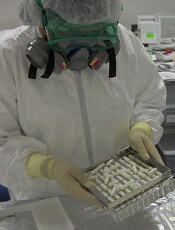
Credit: Esther Dyson
New research has shown that clinical trials carried out in the German Democratic Republic (GDR) in the second half of the 20th century were not always conducted with the full knowledge or understanding of participants.
A review of documents from that time suggests that, although questionable practices took place, the GDR attempted to conduct trials according to international ethical standards.
And there was no evidence to suggest that trial investigators intentionally hurt patients.
Nevertheless, these trials were hidden from the public, there was no record of patient consent, and some documents suggest patients did not receive adequate information.
Dr Rainer Erices, of Friedrich-Alexander-Universität Erlangen-Nuernberg in Germany, and his colleagues detailed these findings in the Journal of Medical Ethics.
The GDR, also known as East Germany, was a state within the Eastern Bloc during the Cold War period and between 1949 and 1990. Since the 1990s, the media has reported that unofficial clinical trials were conducted by Western pharmaceutical companies in East Germany from the 1960s onward.
Reports have suggested the GDR “sold” its patients as “guinea pigs” for experiments in exchange for hard currency; for example, for tests on doping effects in premature babies and on treating seriously ill patients with placebo instead of actual medicine.
However, there is still a lack of reliable data about the extent of studies taking place then, the contracts, the amount of money paid, and more moral issues, such as patient education and informed consent.
Dr Erices and his colleagues set out to uncover more information by evaluating the clinical trials based on archival material from the health system and the secret service.
The team found documents related to 220 trials carried out between 1983 and 1990, which involved more than 14,000 patients and 68 Western pharmaceutical companies.
However, there was no record of patient information forms or systematic documentation regarding the provision of patient consent.
A range of drugs were tested in these studies, including chemotherapeutic agents, heparin, insulin, anti-depressants, anti-allergy drugs, contrast agents, and toothpastes.
Between 1983 and 1990, the GDR’s health system received approximately DM 16.5 million for the trials, which were cost-effective for the drug firms, according to the researchers. The team also noted that the GDR agreed to these trials due to its desperate need for hard currency (impending bankruptcy).
Overall, the files the researchers studied suggested that the GDR attempted to conduct trials according to international ethical standards.
However, the trials were concealed from the public. And state legislation stipulated that patients had to consent to the trials, but no evidence was found to suggest that patients were systematically informed.
Some documents suggested that at least some of the trials were carried out without patients having a comprehensive understanding of what the trial involved. And it was unclear whether the patients themselves knew that they were participating in trials and were aware of all the risks.
The researchers concluded that further investigation of these trials is needed, and specific trials should be studied separately.

